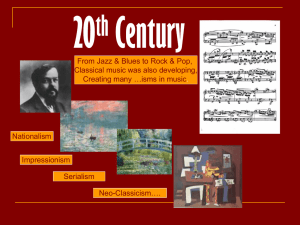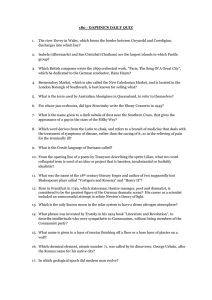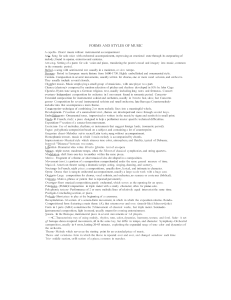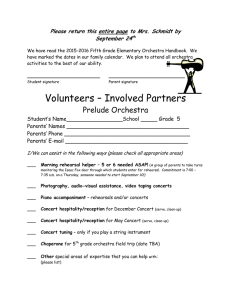TITLE OF COURSE: Music 2020, String Orchestra (Hp)
advertisement
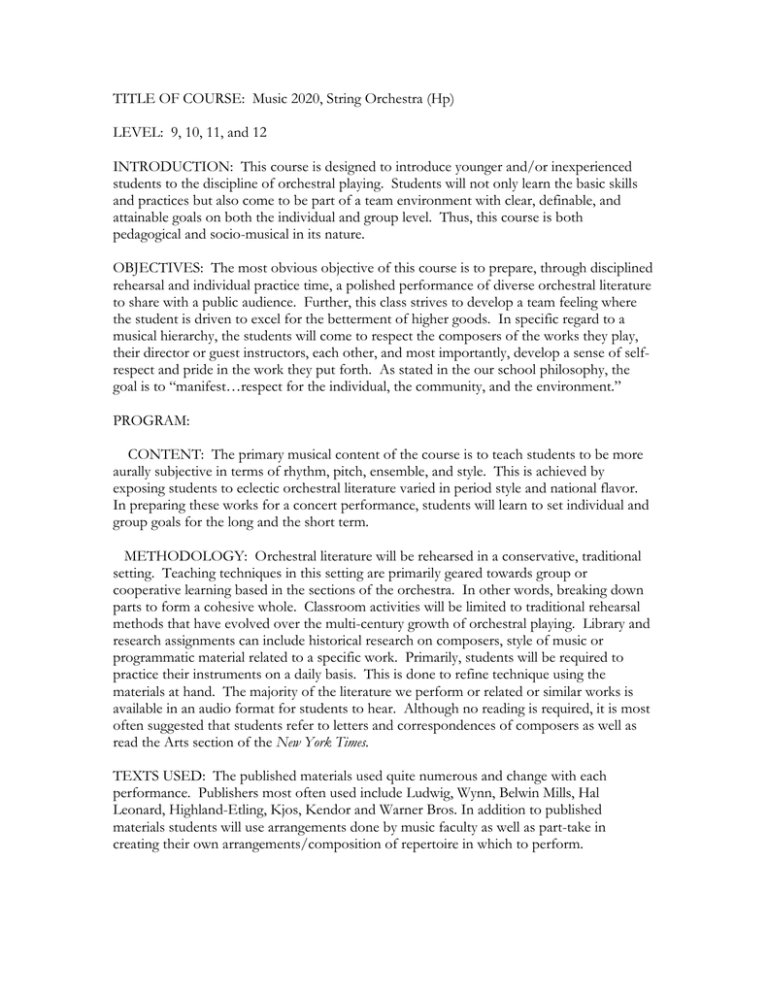
TITLE OF COURSE: Music 2020, String Orchestra (Hp) LEVEL: 9, 10, 11, and 12 INTRODUCTION: This course is designed to introduce younger and/or inexperienced students to the discipline of orchestral playing. Students will not only learn the basic skills and practices but also come to be part of a team environment with clear, definable, and attainable goals on both the individual and group level. Thus, this course is both pedagogical and socio-musical in its nature. OBJECTIVES: The most obvious objective of this course is to prepare, through disciplined rehearsal and individual practice time, a polished performance of diverse orchestral literature to share with a public audience. Further, this class strives to develop a team feeling where the student is driven to excel for the betterment of higher goods. In specific regard to a musical hierarchy, the students will come to respect the composers of the works they play, their director or guest instructors, each other, and most importantly, develop a sense of selfrespect and pride in the work they put forth. As stated in the our school philosophy, the goal is to “manifest…respect for the individual, the community, and the environment.” PROGRAM: CONTENT: The primary musical content of the course is to teach students to be more aurally subjective in terms of rhythm, pitch, ensemble, and style. This is achieved by exposing students to eclectic orchestral literature varied in period style and national flavor. In preparing these works for a concert performance, students will learn to set individual and group goals for the long and the short term. METHODOLOGY: Orchestral literature will be rehearsed in a conservative, traditional setting. Teaching techniques in this setting are primarily geared towards group or cooperative learning based in the sections of the orchestra. In other words, breaking down parts to form a cohesive whole. Classroom activities will be limited to traditional rehearsal methods that have evolved over the multi-century growth of orchestral playing. Library and research assignments can include historical research on composers, style of music or programmatic material related to a specific work. Primarily, students will be required to practice their instruments on a daily basis. This is done to refine technique using the materials at hand. The majority of the literature we perform or related or similar works is available in an audio format for students to hear. Although no reading is required, it is most often suggested that students refer to letters and correspondences of composers as well as read the Arts section of the New York Times. TEXTS USED: The published materials used quite numerous and change with each performance. Publishers most often used include Ludwig, Wynn, Belwin Mills, Hal Leonard, Highland-Etling, Kjos, Kendor and Warner Bros. In addition to published materials students will use arrangements done by music faculty as well as part-take in creating their own arrangements/composition of repertoire in which to perform. EVALUATION: Students will be evaluated primarily on objective discipline, being attendance, punctuality and respect. Further, students will be gauged on their individual growth in regard to technique and re-creation based on what the instructor deems to be their individual potential. The only standing assignment is to be consistently responsible and mature regarding attendance, punctuality and respect as well as daily, at home practice. GRADING: Each quarterly grade will be based almost entirely on participation, with the objectivity of lateness, absences and being prepared with music and equipment. The final grade is an average of the quarterly grades and a final exam with no part exceeding twenty percent. There is no Regents exam. In lieu of a final exam, there is at times a final paper examining a particular work or composer studied that year or a subjective critique of a performance. TIME REQUIMENTS; CLASS SESSIONS: This class meets Monday through Friday during “H” period (thirtyfive minutes) throughout the entire year. HOMEWORK: The minimum expectation for a serious student in this course is to practice one hour each day for five to six days during the week. ASSIGNED WORK: The orchestra’s main objective is to prepare a polished concert program in three to four months given the class sessions and homework stated above.

